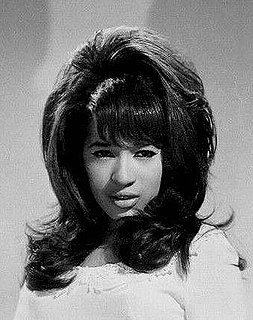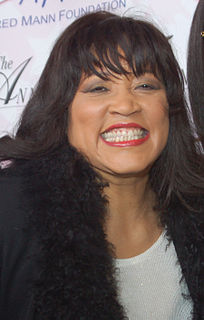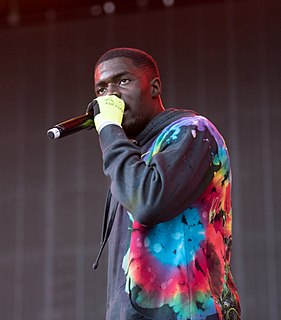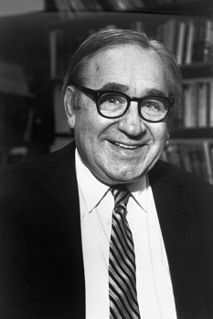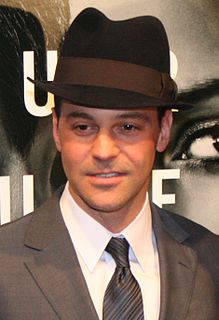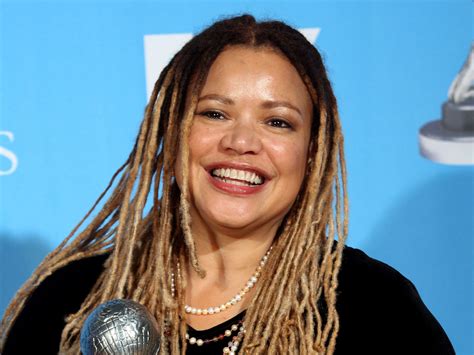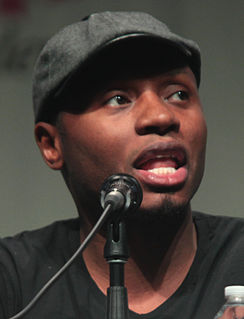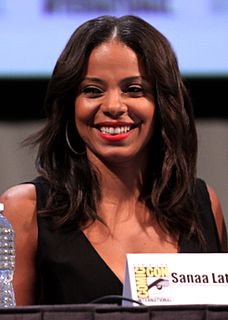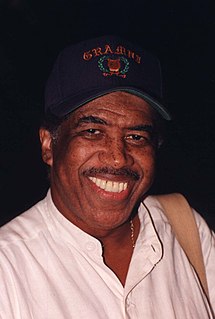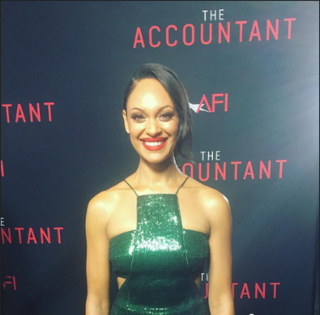Top 284 Harlem Quotes & Sayings - Page 5
Explore popular Harlem quotes.
Last updated on April 17, 2025.
How could I have been the valedictorian, the smartest, and never known Harlem existed? As a result, I began a lifelong learning experience, because I could not accept what the party line was with education - that these people want to live like this, these people don't have ambition, they don't want to work. You know, all the usual bullshit.
I look around me and I don’t see any rock’n’roll at the moment. Instead it’s all choreography and stylists and wigs and stuff. It’s like they’re afraid to let the music breathe. No one has their own identity like the Ronettes did back in the day. We had the skirts with the slits up the side, sort of tough, sort of Spanish Harlem cool, but sweet too. We didn’t have no dancers, we didn’t have no goddamn wigs.
I've always thought it would be fun to update "Hansel and Gretel." I'd have these white parents in the suburbs with an income of fifty or sixty thousand dollars. Daddy loses his job, and the wicked stepmother says, "We could get along, we could keep our Mastercharge, if you'd just get rid of those shitty kids." Finally the father hires a limo and tells the driver, "Drop 'em off on Lenox Avenue in Harlem at two in the morning." These two little white kids land there. They're menaced. And this supposedly nice black lady says, "Would you like some candy?"
Earlier I had been in New York, which was my first time to New York, and I got booked in the Baby Grand up in Harlem there. I was booked there for a week; they kept me there for about a month. That's where Doc Pomus and myself became very close friends and start running together around town and what not.
If there was ever a food that had politics behind it, it is soul food. Soul food became a symbol of the black power movement in the late 1960s. Chef Marcus Samuelsson, with his soul food restaurant Red Rooster in Harlem, is very clear about what soul food represents. It is a food of memory, a food of labor.
I started in theater when I was 14 in the Henry Street Playhouse on the Lower East Side in New York. You hustle, you beat the sidewalk, the pavement - audition, audition. I just started working around town everywhere. I mean everywhere - the Village, Harlem, you know. Brooklyn Academy Of Music. Just job after job.
Former Vermont Governor Howard Dean was all smiles, well smirks, after picking up the endorsement of former Vice President Al Gore at a rally in Harlem ... Gore went on to praise Dean for taking a tough anti-war stance before the invasion of Iraq and he praised Dean supporters in hopes that will ease his concerns over lack of foreign policy experience, and his lack of support among blacks and Latinos, and his hot temperament, and perceived arrogance, and policy flip-flops, and campaign glitches. Well, there's a lot going on here.
Policing has to be done compassionately and consistently. You cannot police differently in Harlem than you're policing downtown. The same laws must apply. The same procedures must be employed. Certain areas at certain times may have more significant crime and require more police presence or more assertiveness, but it has to be balanced.
In Harlem, Facebook was big. Kids would make Facebook 'families,' where they would change their last name on Facebook and have the same last name as their friends. I had this girl I was talking to, and she changed her last name to West, so I changed mine to West, too. It wasn't until later that I took the 't' off.
No individual has done more to help me pursue a career in science than my wife of forty-five years. I met Enid Cassandra Morgan during the election campaign of 1948 when she was a Sunday school teacher, a leader of the youth organizations of St. Phillips Episcopal Church, and the head of Harlem Youth for the election of Henry Wallace.
I'm one of the people who believes that our losses were greater than our gains. Because before the Civil Rights movement we had entrepreneurship in the black community. Right now, in Harlem, if I wanted to get a shoe repaired, I would have a hard time finding a black shoe repairman. On near about every third corner, you could find a decent black barber, decent black laundry, had restaurants in the neighborhood that were open 24 hours. The food was good at 3 o'clock in the morning as at 3 o'clock in the afternoon.
I am grateful to have been loved and to be loved now and to be able to love, because that liberates. Love liberates. It doesn't just hold - that's ego. Love liberates. It doesn't bind. Love says, 'I love you. I love you if you're in China. I love you if you're across town. I love you if you're in Harlem. I love you. I would like to be near you. I'd like to have your arms around me. I'd like to hear your voice in my ear. But that's not possible now, so I love you. Go.'
I didn't know Harlem existed. I didn't know there was such a place, because I grew up in white Queens, where five miles is 100 miles. So I went to the school and, being a smart cookie - as they called us in those days - I had a million questions. How did this place exist? How come I didn't know about it? Why are people living like this? Do they want to live like this?
When reading about what may be described as the lesser celebrated heroic figures of the Harlem Renaissance, we rarely get a definitive look at just how complicated and sometimes dangerous their everyday lives were. In fact, until the past ten years, many defined the period primarily by its well-known literary, musical, and artistic elements while overlooking the fact there was any political component to it at all.
I wanted to pay homage to someone who was such an important literary figure in my life. I think Langston Hughes would be proud of the picture Black Nativity, yet it's a contemporary story about a family living in Harlem. I named the lead character Langston, put a little bit of poetry in there, and some Langston Hughes quotes, and, of course, his stage play, Black Nativity.
When I think of the Harlem Renaissance, I think of bright colors, and bold, dynamic art. African American artists of the period were, in large measure, breaking out of the constrictions white society had set for them. They were claiming and remaking their own images, and doing so in bold and striking ways.
I used to live in the Bronx, then I lived uptown on 106th St. and Broadway, and finally I moved to Harlem right before it became gentrified. I lived on 120th St. between Fifth and Lenox Aves. in a little brownstone. I knew the neighborhood was changing when they started putting trees in the middle of the block.
From the small clubs of the Harlem Renaissance where he began playing saxophone to world tours for the biggest of the big bands, Benny Carter redefined American jazz. From the start, his fellow musicians said the way he played the sax was amazing. They say that about me, too. (Laughter.) But I don't think they mean it in quite the same way.
I'm what they call a 'non-black person of color': NBPOC. It's easy and seductive and common to mobilize around these identity issues, but often that's done at the expense of considering structural anti-blackness. That puts everything in a slightly different light for me, especially because of where I am and why - where I am in the world of the arts, where I live, in Harlem - and the music that I've been able to make, whom I've been able to make it with, who has nurtured me. It's not just about solidarity. It's actually about debt.
That old Bobby Kennedy 1968 form of liberalism where you could be holding hands with the Appalachian family on one day and then be in Harlem the next day and nobody thinks it's weird, that is something that isn't as strong. It was strong in 2008. It hasn't been as strong since then. That's just a reality that we have to deal with that it's not just that the Republicans ran a terrible candidate who had bad ideas, it's also that the circle of love and affirmation that we have as progressives can sometimes just not be big enough.
A long time ago, I took a walk down a street in Harlem in New York City. I came upon a man who asked me for a dollar. He had asked a few other people before me, but they only passed him by without glancing his way. I stopped and handed the man some money. As I began to turn away, he reached out and shook my hand. He looked me in the eyes and said, "I will bless you." Now, I'm not saying that was God Himself. But how do we know that it wasn't someone working for him, walking around in disguise, just to see what we would do?
The thing that surprised me the most is just how much money women that weren't rich were paying for their hair. When you're in a beauty parlor in Harlem next to abandoned buildings and somebody's paying five grand for a weave, that's a bit much. I think this is, in a weird way, part of the health care debate. It's like, hmm, there's people with $2000 weaves that could have bought health care with that weave money.
One of my first role models was Eugene Lang, a wealthy businessman who went back to his elementary school in East Harlem and addressed the sixth-grade class. He looked out at that sea of faces and said, "If any of you wants to go to college, I will pay for it." When I read that, I burst into tears. It was so generous and so basic. Not fluffy. I can't understand why we scrimp on education and shortchange our kids. Why would the citizenry do that to the people who are going to inherit its republic?
In my neighborhood - West 121st Street in New York, "white Harlem" - there were only two drugs: smack and marijuana. By the time I was 13, some friends and I were using marijuana fairly regularly. The Reefer Madness myth was still very strong then, but I'd been into jazz and those lyrics included so many casual references to pot that it was completely demystified for me.
I'm not guilty. You're the one that's guilty. The lawmakers, the politicians, the Colombian drug lords, all you who lobby against making drugs legal. Just like you did with alcohol during Prohibition. You're the one who's guilty. I mean, c'mon, let's kick the ballistics here: ain't no Uzi's made in Harlem. Not one of us in here owns a poppy field. This thing is bigger than Nino Brown. This is big business. This is the American way.
Where do people get off saying the Beatles should give $200,000,000 to South America? You know, America has poured billions into places like that. It doesn't mean a damn thing. After they've eaten that meal, then what? It lasts for only a day. After the $200,000,000 is gone, then what? It goes round and round in circles. You can pour money in forever. After Peru, then Harlem, then Britain. There is no one concert. We would have to dedicate the rest of our lives to one world concert tour, and I'm not ready for it. Not in this lifetime, anyway.
This is your heritage,' he said, as if from this dance we could know about his own childhood, about the flavor and grit of tenement buildings in Spanish Harlem, and projects in Red Hook, and dance halls, and city parks, and about how his own Paps, how he had beat him, how he taught him to dance, as if we could hear Spanish in his movements, as if Puerto Rico was a man in a bathrobe, grabbing another beer from the fridge and raising it to drink, his head back, still dancing, still steeping and snapping perfectly in time.
And then there was moments with white guy where like we would be in Harlem. There would be five brothers in the corner, and this is an awful feeling but you're holding his hand and you want to pull your hand away cause you don't want the judgment. And you're gonna get the judgment even if it's just in looks. And the black men are the worst when it comes to judging.
I think that once you're able to sort of get in line with who and how you relate to the world, you'll become closer to this index that I'm referring to. Because what you want is this card that relates to that book. What you want is this human that relates to this world, rather than having this art school society scattering that point of view somewhere in between. It becomes diffused. And that level of clarity, I think, was gained at the Studio Museum in Harlem.
Liberals believe that crime is inextricably linked with poverty. In reality, most poor people never resort to crime, and some wealthy people commit evil acts to enrich themselves further. Harlem, East Los Angeles, the South side of Chicago are not the poorest communities in the United States. According to a new U.S. Bureau of the Census report, the poorest communities are Shannon County, South Dakota, followed by Starr, Texas, and Tunica, Mississippi. Have you ever heard of these residents rioting to protest their living conditions?
I kept finding the same anguish, the same doubt; a self-contempt that neither irony nor intellect seemed able to deflect. Even DuBois’s learning and Baldwin’s love and Langston’s humor eventually succumbed to its corrosive force, each man finally forced to doubt art’s redemptive power, each man finally forced to withdraw, one to Africa, one to Europe, one deeper into the bowels of Harlem, but all of them in the same weary flight, all of them exhausted, bitter men, the devil at their heels.
A dream role is a role that you can't even picture for yourself. Everything I've ever played I never pictured I would get a chance to play. It [has] gone beyond my wildest dreams. One thing I would love to do in my lifetime is a movie musical. I've wanted to do that since I was a kid. That's what made me interested in acting in the first place. I would do any type of musical, but I love the Harlem Renaissance era. I think a dream role in something that I probably can't see and I don't know when it's going to come.
Here's what I love: when a great writer turns me into a Jew from Chicago, a lesbian out of South Carolina, or a black woman moving into a subway entrance in Harlem. Turn me into something else, writers of the world. Make me Muslim, heretic, hermaphrodite. Put me into a crusader's armor, a cardinal's vestments. Let me feel the pygmy's heartbeat, the queen's breast, the torturer's pleasure, the Nile's taste, or the nomad's thirst. Tell me everything that I must know. Hold nothing back.
The first time I went to New York, I went with my first boyfriend, Clark. His dad had just bought an apartment in New York, and my dad dropped us off, and we were there for a week on our own. I must have been 15 or 16. I remember I went to Harlem and bought a goose jacket. That was the hip, hot thing.
I talked to my mother about it a lot. I asked her what it was like to grow up in New York and Harlem in the 1920s and 1930s, and I asked her about a woman leaving her husband. I asked her about how she would feel about that woman, and my mother grew up in the Church Of God In Christ, and she told me that the woman might be isolated because the other women thought she might go and come after their husbands. That's how they thought then.

